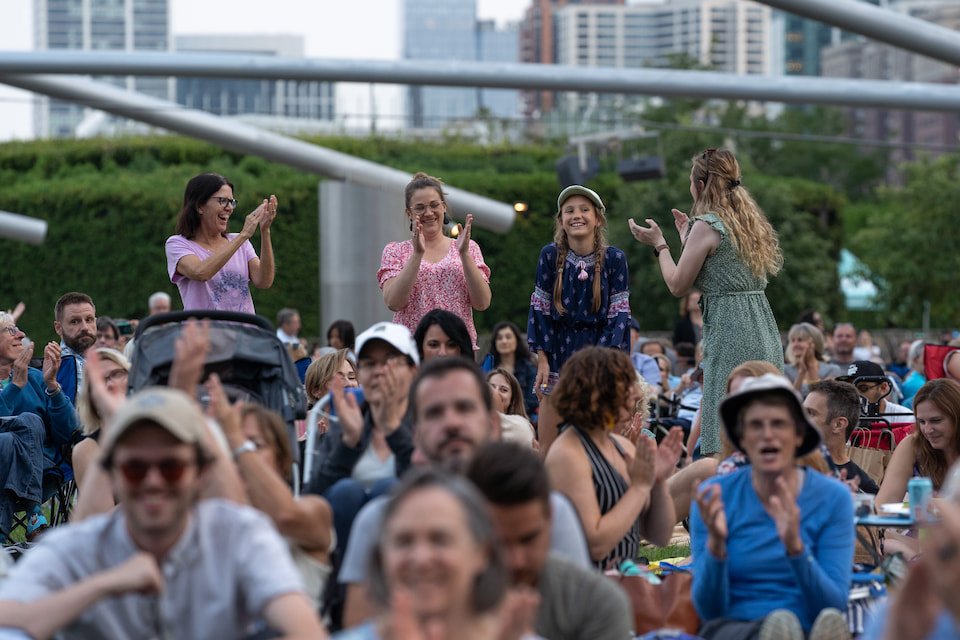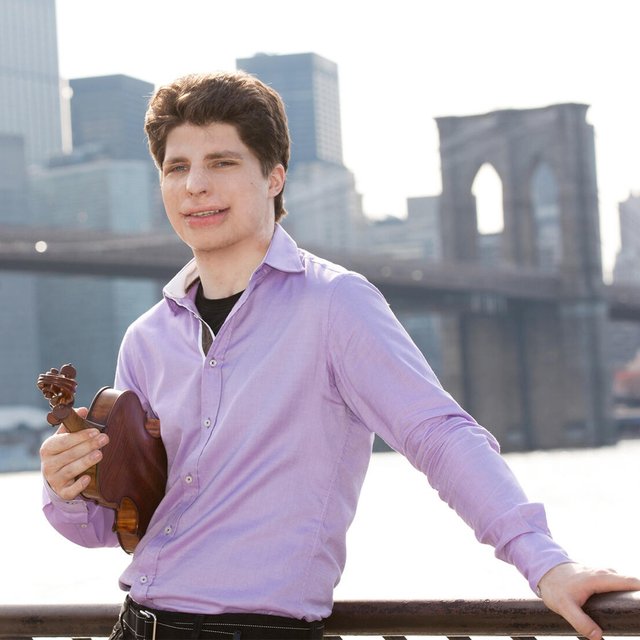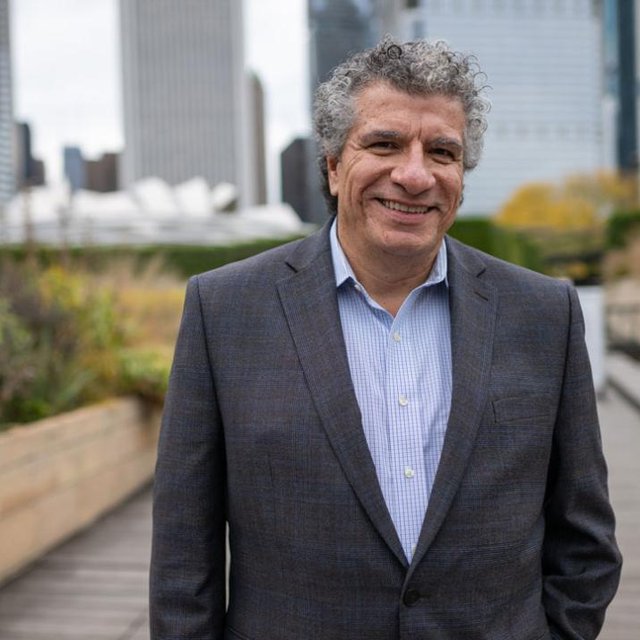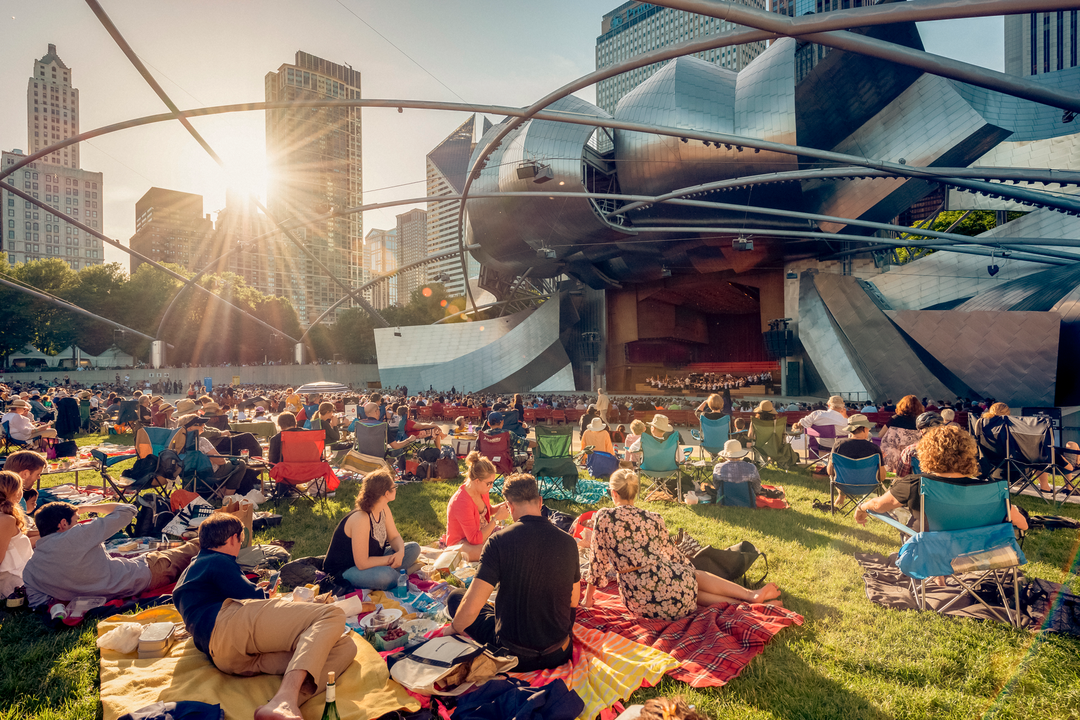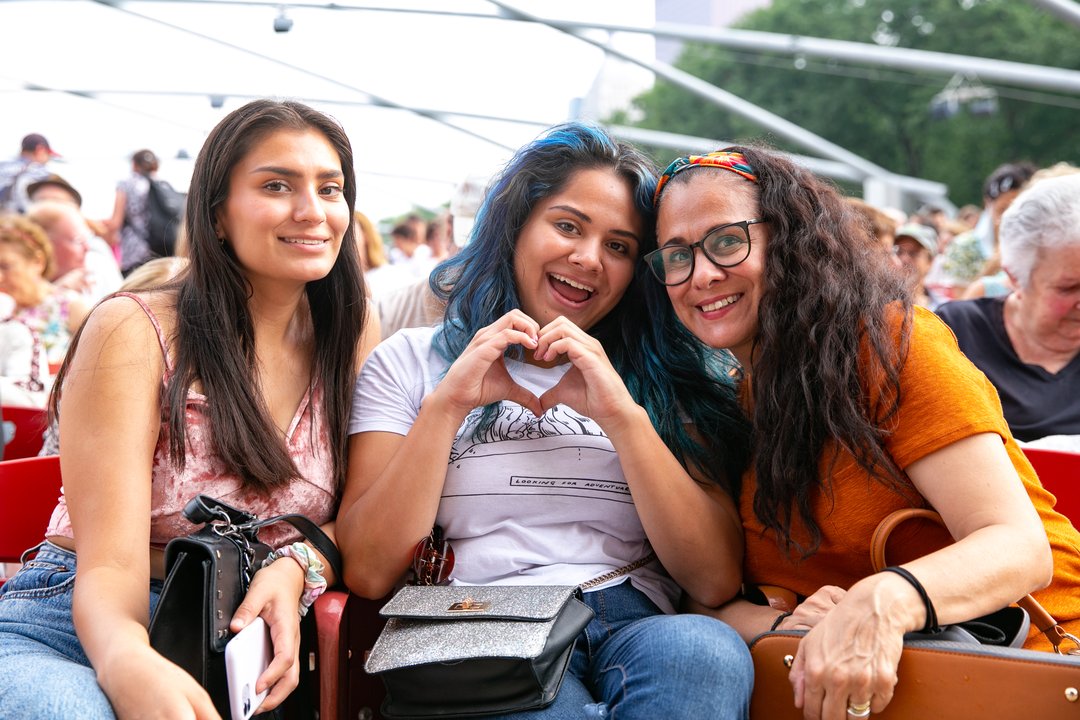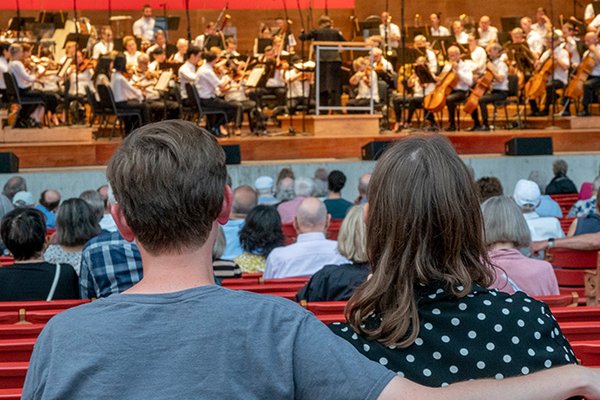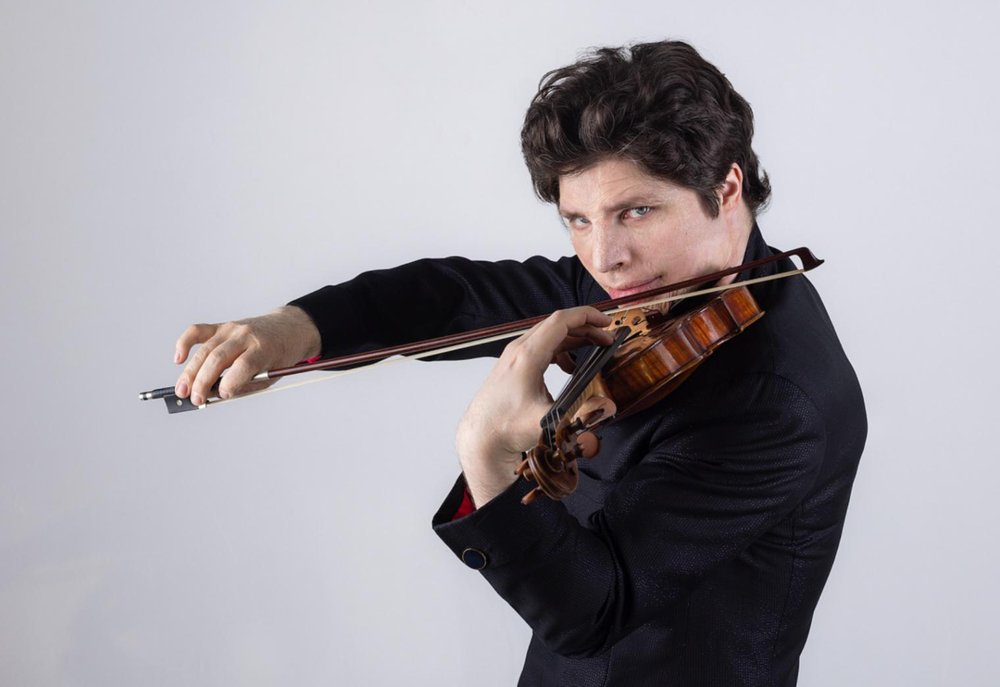
Tchaikovsky Violin Concerto
Program
Mykola Lysenko Overture to Taras Bulba (5 mins)
Piotr Ilyich Tchaikovsky Violin Concerto (33 mins)
Allegro moderato
Canzonetta: Andante
Finale: Allegro vivacissimo
Intermission (20 mins)
Sergei Prokofiev Symphony No. 5 (46 mins)
Andante
Allegro moderato
Adagio
Allegro giocoso
Featuring
-
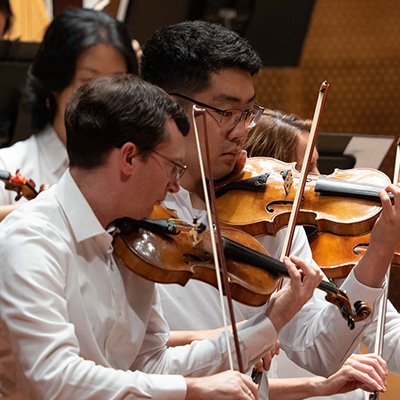
Grant Park Orchestra
Orchestra
-

Keri-Lynn Wilson
Conductor
Program Notes
Mykola Lysenko (1842–1912)
Overture to Taras Bulba (1880)
Scored for: three flutes including piccolo, three oboes including English Horn, three clarinets including bass clarinet, three bassoons including contrabassoon, four French horns, three trumpets, three trombones, tuba, timpani, percussion, harp, and strings
Performance time: 5 minutes
First Grant Park Orchestra performance
Ukrainian composer Mykola Lysenko never got to see his opera Taras Bulba performed during his lifetime. His insistence on using Ukrainian text and folk music prevented its production in what was then the Russian Empire, which sought to suppress the Ukrainian language and culture. Nicknamed “the father of Ukrainian classical music,” Lysenko composed several operas as well as works for choir, orchestra, piano, and chamber ensembles. He also founded the Ukrainian National School of Music, where he taught a generation of Ukrainian composers.
Based on the novella Taras Bulba by Nikolai Gogol, the opera takes place in 17th-century Ukraine when Poland was fighting for supremacy in the region. In fighting for his people’s freedom, the Cossack patriarch Taras Bulba ends up killing his son for treason after he falls in love with the daughter of the Polish governor. The opera was performed for the first time in 1924 in Kharkiv. After undergoing significant revisions in the 1930s and 1950s, the opera now traditionally closes out each season at the Kyiv Opera House, though it is still rarely performed in the West.
Piotr Ilyich Tchaikovsky (1840–1893)
Concerto in D major for Violin & Orchestra, op. 35, TH 59 (1878)
Scored for: two flutes, two oboes, two clarinets, two bassoons, four French horns, two trumpets, timpani, strings, and solo violin
Performance time: 33 minutes
First Grant Park Orchestra performance: September 5, 1936; Joseph Raffaelli, conductor and Mischa Elman, violin
Just four years after pianist Nikolai Rubinstein’s notorious condemnation of his First Piano Concerto, Piotr Ilyich Tchaikovsky again faced damning criticism for a work that would later become an audience favorite. In the spring of 1878, Tchaikovsky escaped the fallout from his failed marriage by absconding to the Swiss resort town of Clarens on Lake Geneva. There, he composed his Violin Concerto in D Major, Op. 35, with the help of violinist Iosif Kotek, a former student from the Moscow Conservatory. The two had become close friends and collaborators after Kotek’s graduation in 1876. The young violinist proved a useful resource not only in helping Tchaikovsky workshop the Violin Concerto but also in connecting the composer with his future patron, the reclusive widow Nadezhda von Meck. Her patronage would give Tchaikovsky the financial security to quit teaching and compose full-time.
Tchaikovsky dedicated the Violin Concerto to violinist Leopold Auer, a colleague at the conservatory who had lobbied to premiere the work. However, Auer was not exactly thrilled when Tchaikovsky presented him with the completed score. In an interview in 1912, Auer said, “I regretted that the great composer had not shown it to me before committing it to print. Much unpleasantness might then have been spared us both.” According to Tchaikovsky, Auer said the concerto was “impossible to play” and “a mockery of the public”—much like the comments he had received from Rubinstein on his Piano Concerto. Auer insisted his criticism was more measured, his main complaint being that certain solo passages were not idiomatic for the instrument. Regardless of what words were actually exchanged, Tchaikovsky was hurt and the situation got messy. Auer’s lack of support meant the concerto was not performed until 1881, when it premiered to an unsympathetic audience in Vienna. Auer eventually came around to the Violin Concerto after making some edits to the violin part. He not only became a celebrated interpreter of the work but also taught it to his many illustrious students, including Jascha Heifetz.
The first movement begins simply with a minimally accompanied melody for the violins. A suspenseful dominant pedal in the low strings anticipates the solo violin’s entrance with a quiet iteration of the noble first theme. This melody alternates with a more sinuous second theme. These two themes are developed throughout the movement, with transitional passages providing the soloist ample opportunities for virtuosic display. Tchaikovsky did make one substantial edit after Auer’s comments: completely rewriting the slow movement. (He would recycle the original Andante in his suite for violin and piano Souvenir d’un lieu cher.) Titled “Canzonetta,” the movement’s sorrowful song-like melody is first presented over muted strings, then in duet with the flute and clarinet. A transitional cadenza flows straight into the spirited finale. Recalling the violin’s roots as a folk instrument, the rondo-form finale evokes a Slavic dance, again allowing the violinist plenty of opportunities for soloistic bravura.
Sergei Prokofiev (1891–1953)
Symphony No. 5 in B-flat major, op. 100 (1944)
Scored for: three flutes including piccolo, three oboes including English Horn, four clarinets including bass clarinet, three bassoons including contrabassoon, four French horns, three trumpets, three trombones, tuba, timpani, percussion, harp, piano, and strings
Performance time: 46 minutes
First Grant Park Orchestra performance: August 9, 1961; Irwin Hoffman, conductor
Just as Sergei Prokofiev took the stage on January 13, 1945, to conduct the premiere of his Fifth Symphony, news reached Moscow that the Red Army had crossed the Vistula River into German-occupied Poland, marking the beginning of the defeat of the Nazis on the Eastern Front. In the silence of the auditorium, celebratory gunfire could be heard outside. Pianist Sviatoslav Richter, who was in attendance, recalled the scene: “When Prokofiev mounted the podium and silence set in, artillery salvos suddenly thundered. His baton was already raised. He waited, and until the cannon fire ceased, he didn’t begin. There was something very significant, very symbolic in this. It was as if all of us—including Prokofiev—had reached some kind of shared turning point.”
The tide was already starting to turn in favor of the Allies when Prokofiev set to work on his Fifth Symphony, hope for the war’s end in the air. Prokofiev composed the symphony—his first in 16 years—while staying at the Composers’ House in Ivanovo. Established by the Union of Soviet Composers, it was designed to give artists a quiet place to work away from the war-torn cities. This symphony ended up being one of his finest creations, with Prokofiev calling it “the culmination of an entire period of my work.” The Fifth Symphony marked the pinnacle of both his career and his standing with the government, earning him the Stalin Prize, First Class, in 1946. It was soon recorded and adopted by orchestras around the world. He was even featured on the cover of Time Magazine shortly after the American premiere by Serge Koussevitzky and the Boston Symphony Orchestra in November 1945.
Prokofiev said his Fifth Symphony was “a hymn to free and happy man, to his mighty powers, his pure and noble spirit.” While this statement was likely curated to appease Soviet officials, the work does carry an air of defiance and celebration. The opening melody of the Andante, presented with austere accompaniment at first, eventually builds in confidence, prevailing in hulking fortissimo by the end of the coda. Two other themes feature in the first movement: a more lyrical theme with sumptuous chromatic inflections, introduced by the flute and oboe, and a jittering theme of leaping and repeated 16th notes. The Allegro moderato is a witty scherzo and trio. After the scherzo’s jaunty clarinet theme, the clarinet and viola offer a snaky, sinuous melody in the trio, punctuated by snare drum and tambourine. When the scherzo returns in tiptoeing brass, it takes on a more sinister quality.
The following Adagio is dense and somber. A long-lined woodwind melody emerges from hefty bass chords and triplet string arpeggios. The lyrical melody swells in full strings before a funereal march takes over in the dark middle section. After a tortured climax of percussive bombast, the opening material returns, the movement ending gently with an ascending clarinet arpeggio. The finale begins with a graceful yet curious wind melody. Divided cellos soon restate the opening movement’s first theme. After this quiet introduction, the musical material becomes more excited, living up to the movement’s “giocoso” (or “playful”) marking. Prokofiev continually ratchets up the intensity, the coda spinning into a dizzying frenzy and ending with a bang.
—Katherine Buzard
Event Sponsors
The appearance of Augustin Hadelich is generously underwritten by Jeannette and Jerry Goldstone.
Artistic Leadership
-
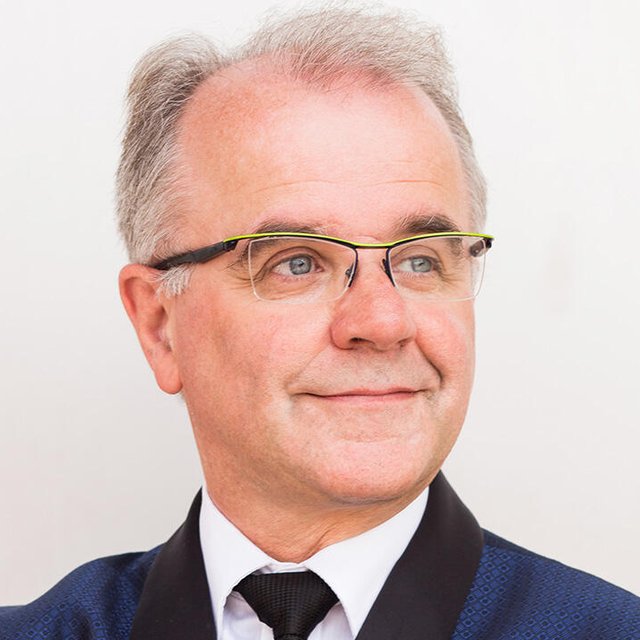
Christopher Bell
Chorus Director
Support The Festival
Violin I
Jeremy Black, concertmaster
Vacant, assistant concertmaster
Trista Wong
Zulfiya Bashirova
Jennifer Cappelli
Injoo Choi
Dima Dimitrova
Erica Hudson
Hyewon Kim
Matthew Lehmann
Jayna Park
Rika Seko
Karen Sinclair
Bonnie Terry
Krzysztof Zimowski
Violin II
Liba Shacht, principal
Vacant, assistant principal
Ying Chai
Ran Cheng
Karl Davies
Likai He
Ann Lehmann
Laura Miller
Cristina Muresan
Kjersti Nostbakken
Irene Radetzky
Jeanine Wynton
Thomas Yang
Viola
Terri Van Valkinburgh, principal
Yoshihiko Nakano, assistant principal
Elizabeth Breslin
Beatrice Chen
Amy Hess
Rebecca Swan
Chloé Thominet
Cello
Walter Haman, principal
Peter Szczepanek, assistant principal
Calum Cook
Larry Glazier
Steven Houser
Eric Kutz
Eran Meir
Double Bass
Colin Corner, principal
Peter Hatch, assistant principal
Andrew Anderson
Christian Luevano
Samuel Rocklin
Chunyang Wang
Chris White
Flute
Vacant, principal
Alyce Johnson
Jennifer Lawson, assistant principal
Piccolo
Jennifer Lawson
Oboe
Mitchell Kuhn, principal
Vacant
Anne Bach, assistant principal
English Horn
Anne Bach
Clarinet
Dario Brignoli, principal
Trevor O’Riordan, assistant principal
Besnik Abrashi
Bass Clarinet
Besnik Abrashi
Bassoon
Eric Hall, principal
Nicole Haywood Vera Tenorio, assistant principal
Vacant
Contrabassoon
Vacant
Horn
Vacant, principal
Stephanie Blaha, assistant principal
Neil Kimel
Brett Hodge
Paul Clifton
Trumpet
David Gordon, principal
Mike Brozick
Vacant, assistant principal
Vacant
Trombone
Daniel Cloutier, principal
Jeremy Moeller, assistant principal
Bass Trombone
Alexander Mullins
Tuba
Andrew Smith, principal
Timpani
Daniel Karas, principal
Josh Jones, assistant principal
Percussion
Josh Jones, principal
Vacant, assistant principal
Doug Waddell
Harp
Kayo Ishimaru-Fleisher, principal
Keyboards
Christopher Guzman
Orchestra Librarian
Eliza Bangert, principal
Grant Park Chorus
* denotes leave-of-absence † 2025 Vocal Fellow
Laura Lynch Anderson
Kristina Bachrach
Madalynn Baez
Megan E. Bell
Alyssa Bennett
Tamara Bodnar
Kylie Buckham
Anna Joy Buegel
Laura Bumgardner
Katherine Buzard
Bethany Clearfield
Nathalie Colas
Carolyne DalMonte
Megan Fletcher
Kaitlin Foley
Saira Frank
Julia Frodyma
Katherine Gray-Noon
Kimberly Gunderson
Alexandra Ioan
Alexandra Kassouf
Darlene Kelsey
Olivia Knutsen
Marybeth Kurnat
Katelyn Lee
Kyuyim Lee+
Rosalind Lee
Veronica Mak
Hannah Dixon McConnell
Marie McManama
Kathleen Monson
Susan Nelson
Evangeline Ng
Máire O'Brien
Alexandra Olsavsky
Laura Perkett
Angela Presutti Korbitz
Alexia Rivera
Veronica Samiec
Emily Sinclair
Molly Snodgrass
Tiana Sorenson
Christine Steyer
Sarah van der Ploeg*
Lydia Walsh-Rock
Sherry Watkins
Emily Amesquita
Melissa Arning
Christina Bernardoni
Angela Born
Bethany Brewer
Julie DeBoer
Leah Dexter
Katrina Dubbs
Stacy Eckert
Margaret Fox
Catarine Hancock
Ruth Ginelle Heald
Sophia Heinz
Miya Higashiyama
Carla Janzen
Amy Allyssa Johnson
Kathryn Kinjo Duncan
Amanda Koopman
Anna Laurenzo
Jeannette Lee
Thereza Lituma
Chelsea Lyons
Victoria Marshall
Jessica McCarthy
Quinn Middleman
Ella Peters
Sarah Ponder
Emily Price
Stephanie Schoenhofer
Suzanne A. Shields
Marissa Simmons
Cassidy Smith
Aidan Spencer
Alannah Spencer
Margaret Stoltz
Carolyn Sundlof Boudreau
Gabrielle Timofeeva López
Elizabeth Vaughan
Corinne Wallace-Crane
A.J. Wester
Debra Wilder
Isabel Yang+
Charles Anderson
Enrico Giuseppe Bellomo
Justin Berkowitz
Madison Bolt
Hoss Brock
Steven Caldicott Wilson
Opal Clyburn-Miller+
John J. Concepción
Micah Dingler
Jared V. Esguerra
Alec Fore
Ace Gangoso
Klaus Georg
Tejas Gururaja
Paul Hunter
Garrett Johannsen
William Johnson
James Judd
Tim Lambert
Tyler Lee
Stephen D. Noon
Marcos Ochoa
Brett Potts
Nicholas Pulikowski
Peder Reiff
Samuel Rosner
Matthew W. Schlesinger
Joe Shadday
Aaron Short
Brian Skoog
Michael St. Peter
Ryan Townsend Strand
Alan Taylor*
Sean J. Watland
Nate Widelitz
Walter Aldrich
Evan Bravos
Matthew Brennan
Michael Cavalieri
Ryan J. Cox
Ed Frazier Davis
Lifan Deng
Matthew Dexter+
Chris DiMarco
Christopher Filipowicz
Dimitri German
Dominic German
David Govertsen
Spencer Greene
Brian Hupp
Jan Jarvis
Jess Koehn
Eric Miranda
Ian Morris
Ian Murrell
John E. Orduña
Wilbur Pauley
Douglas Peters
Jackson Pierzina
Martin Lowen Poock
Ian Prichard
Dan Richardson
Stephen Richardson
Benjamin D. Rivera
Scott Uddenberg
Schyler Vargas
Vince Wallace
Aaron Wardell
Ronald Watkins
Jonathon Weller
Peter Wesoloski
Jonathan Wilson
Chuck Foster
John Goodwin
Kyuyim Lee
Isabel Yang
Opal Clyburn-Miller
Matthew Dexter
